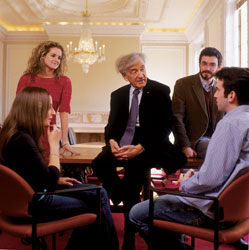
Students in the classroom with Professor Wiesel after a session of his Faith and Power seminar. Photo by Webb Chappell. Source: BU Today
Prof. Elie Wiesel has always played a central role in our fall series of lectures for CC101 students, as a scholar, certainly, but also as a representative of a tradition of conscience and wisdom that we are fortunate to benefit from in our community and our world. As I was listening to him speak once again on Exodus this week, I was reminded of a passage from the end of his Nobel Prize acceptance speech:
There is so much to be done, there is so much that can be done. One person—a Raoul Wallenberg, an Albert Schweitzer, a Martin Luther King Jr.—one person of integrity can make a difference, a difference of life and death. As long as one dissident is in prison, our freedom will not be true. As long as one child is hungry, our life will be filled with anguish and shame. What all these victims need above all is to know that they are not alone; that we are not forgetting them, that when their voices are stifled we shall lend them ours, that while their freedom depends on ours, the quality of our freedom depends on theirs.
This is what I say to that young Jewish boy wondering what I have done with his years. It is in his name that I speak to you and that I express to you my deepest gratitude as one who has emerged from the Kingdom of Night. We know that every moment is a moment of grace, every hour an offering; not to share them would mean to betray them.
Our lives no longer belong to us alone; they belong to all those who need us desperately.
(from Night, published by Farrar, Straus and Giroux, 2006, page 120)
We invite you—students who were in the lecture this week, and alumni who have had the chance to hear Prof. Wiesel in previous semesters—to share your own reflections on his lectures, or his writings, whether here on the Core blog, through discussion on the EnCore Facebook page, or in person with your classmates.

One Comment
Marguerite posted on September 30, 2010 at 10:31 am
I remember Elie Wiesel’s insightful lecture last year in CC101; he spoke so poignantly about the suffering of Job.